Key takeaways:
- Sibling rivalry often stems from competition for parental attention, differing personalities, and external pressures, leading to emotional challenges.
- Effective strategies to reduce rivalry include fostering teamwork through shared activities, acknowledging individual strengths, and encouraging open communication.
- Teaching conflict resolution skills is crucial; using open dialogue and compromise can transform disputes into opportunities for understanding and connection.
- Personal experiences highlight the potential for playful competition to reinforce bonds, showcasing that rivalry can be navigated positively.
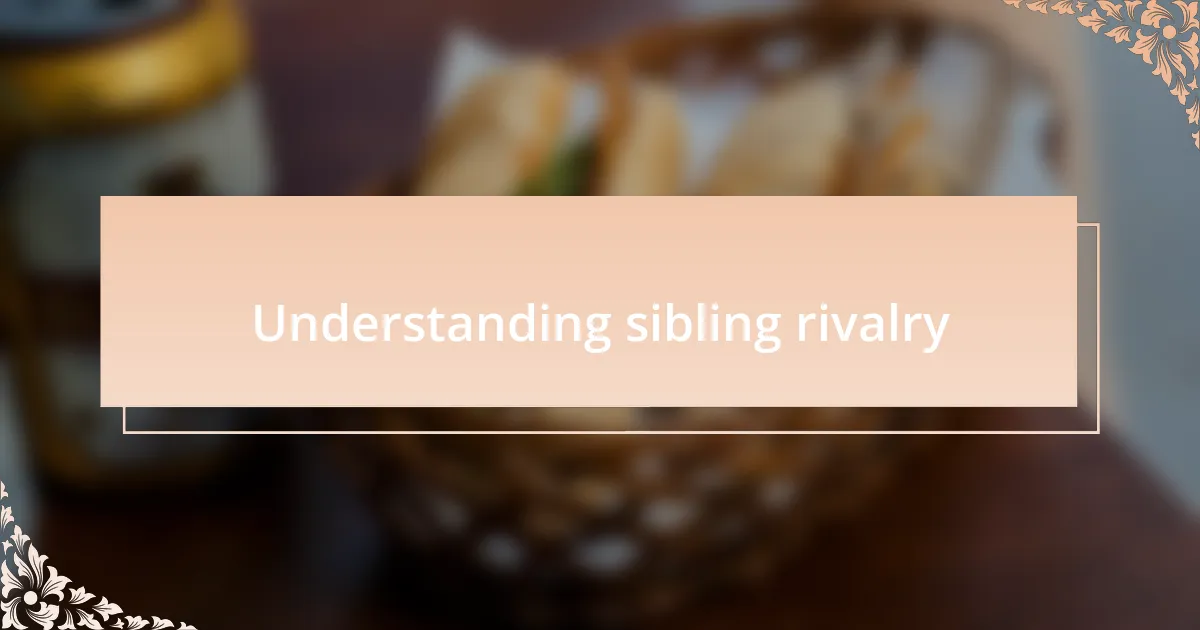
Understanding sibling rivalry
Sibling rivalry is a natural part of growing up, often fueled by competition for attention and resources. For instance, I remember the tug-of-war for my parents’ approval during family gatherings. It made me wonder, why does this rivalry feel so intense sometimes? The emotional stakes are high, and it’s essential to understand that beneath the conflicts lies a desire for connection and recognition.
From my experience, rivalries can manifest in subtle ways, like choosing sides during family games or competing for the last slice of pizza at brunch. These small moments often escalate, creating long-lasting tensions. Have you noticed how easy it is for a playful jab to turn into a bitter memory? It’s this complexity that makes sibling relationships fascinating and challenging.
Understanding the root causes of rivalry can help navigate these dynamics. I’ve found that open communication and empathy go a long way in resolving conflicts. Reflecting on my own experiences, I’ve learned to appreciate my siblings’ perspectives, which ultimately fosters a deeper bond. Isn’t it interesting how, amidst the rivalry, we’re all just seeking our place in the family?
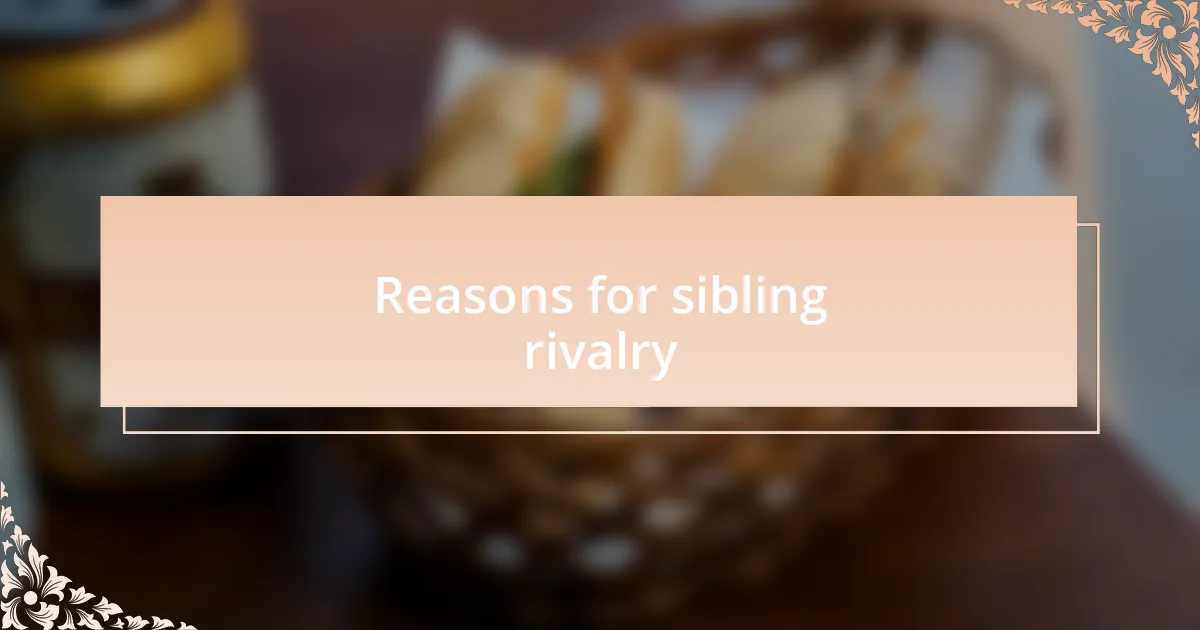
Reasons for sibling rivalry
It’s fascinating how every household seems to have its own unique recipe for rivalry. One common reason is the competition for parental attention and love. I vividly recall those moments when I would intentionally perform better in school, hoping my parents would notice. Did I want more approval, or was it just about being the star of the show in my family’s eyes? The struggle for acknowledgment often creates a sense of inadequacy that fuels tension between siblings.
Another factor is the natural differences in personalities and interests. I have one sibling who was always the creative type, while I leaned towards academics. This divergence sometimes led to misunderstandings, sparking feelings of jealousy. Have you ever felt overshadowed by a sibling’s talent? I certainly have. These feelings can linger, creating an atmosphere where competition replaces camaraderie.
Then there’s the influence of external factors, like peer pressure and social comparison. I distinctly remember feeling the weight of expectations when comparing grades with friends at school. It would often spill over into my relationship with my siblings. Did we all want to prove we were the best? The need to compete with each other often stems from wanting to validate our worth in the eyes of others, which is a powerful, yet challenging, aspect of sibling dynamics.
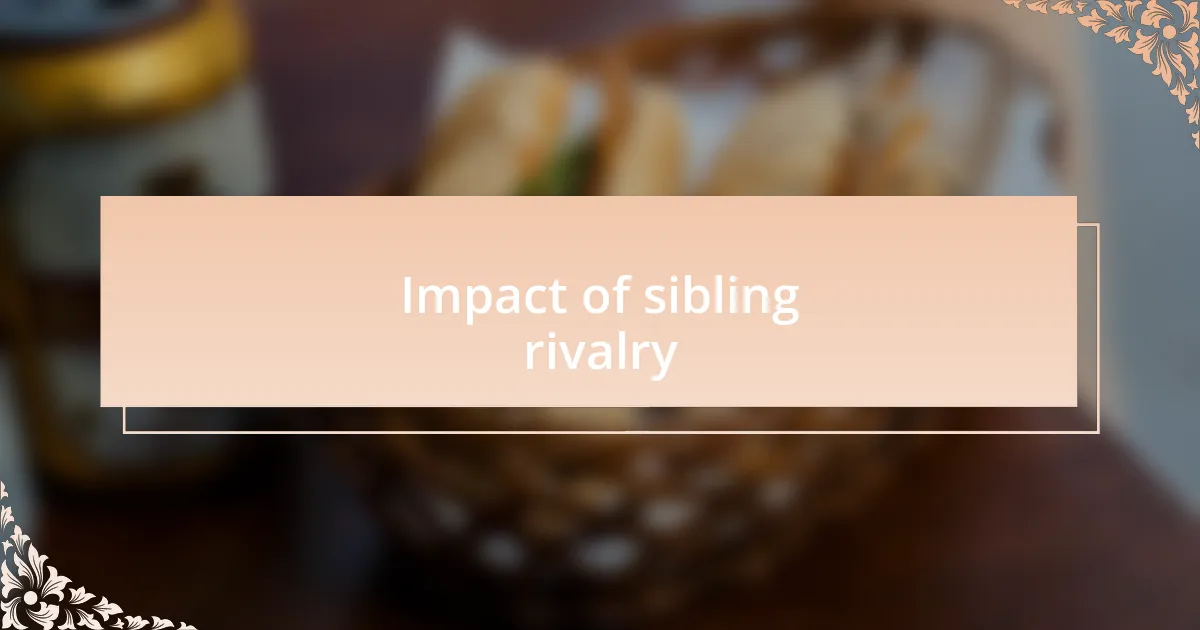
Impact of sibling rivalry
Sibling rivalry can profoundly impact emotional well-being and relationships. I remember feeling a constant tug-of-war with my brother over every little achievement. It wasn’t just about grades or accolades; it affected how we viewed ourselves. You might find that such feelings create lingering doubt, making it tough to celebrate each other’s successes. Isn’t it strange how a sibling can either be your biggest supporter or your fiercest competitor?
The tension doesn’t just stay within the walls of your home; it can ripple out into relationships with friends and even affect your confidence. I’ve witnessed how constant rivalry can lead to isolation, as I would often hesitate to share my wins with friends for fear of fueling the competition. Have you ever held back good news, worried that it might ignite jealousy? This dynamic can create a barrier that stifles connections instead of nurturing them.
Moreover, unresolved conflicts born from rivalry can lead to estrangement as adults. I’ve seen it firsthand; siblings who once shared a close bond drift apart over years of competition and resentment. It makes me wonder, how do we break the cycle? That’s an essential question for anyone navigating these tumultuous relationships. Recognizing the impact of rivalry is the first step toward healing and fostering healthier connections.
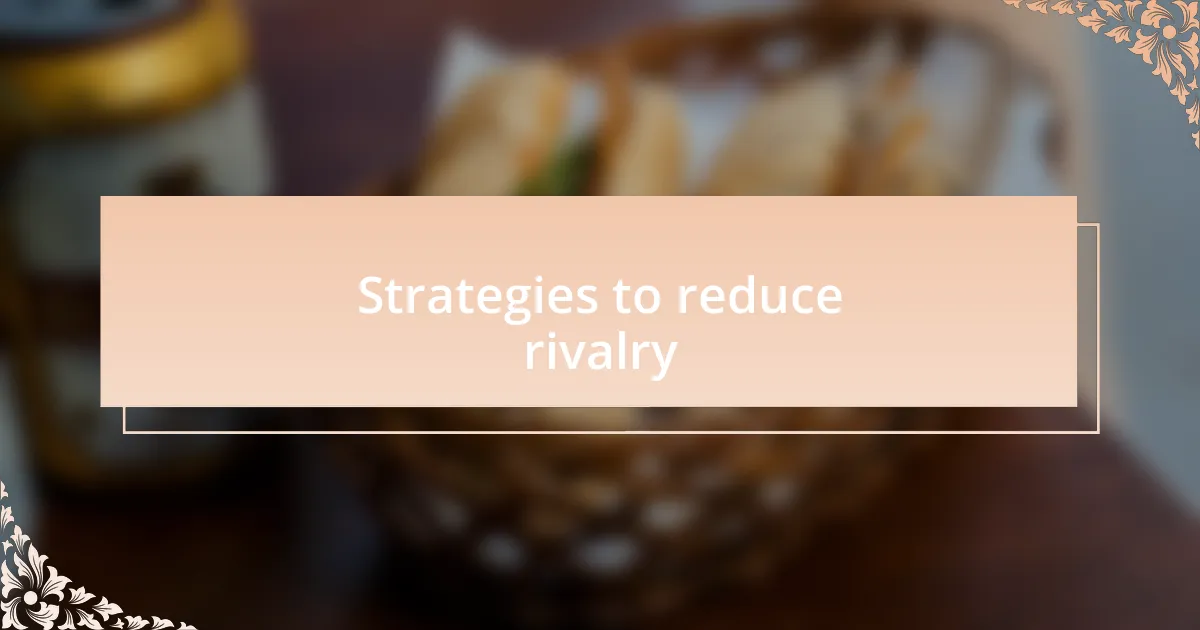
Strategies to reduce rivalry
Finding ways to reduce rivalry between siblings can yield amazing results. In my experience, one effective strategy is to encourage cooperative activities. I remember how my brother and I had to team up for a school project, which unexpectedly helped us see the value in working together. Have you ever noticed how shared experiences can shift perspectives? Fostering a sense of teamwork can transform competition into collaboration.
Another strategy involves creating opportunities for individual strengths to shine. For instance, I started highlighting each of our unique talents at family gatherings. When I recognized my sister’s knack for art while showcasing my own interest in sports, it helped diminish the need to compare ourselves constantly. Isn’t it refreshing to celebrate differences instead of similarities? This approach fosters respect and admiration, crucial components for a harmonious relationship.
Finally, open communication is vital. I learned early on that discussing our feelings about rivalry can significantly ease the tension. I remember sitting down with my siblings to openly share how competition made us feel, leading to a better understanding of each other’s perspectives. Don’t you think that sharing openly creates a safe space? In my experience, this practice not only strengthens bonds but also promotes empathy and patience among siblings.
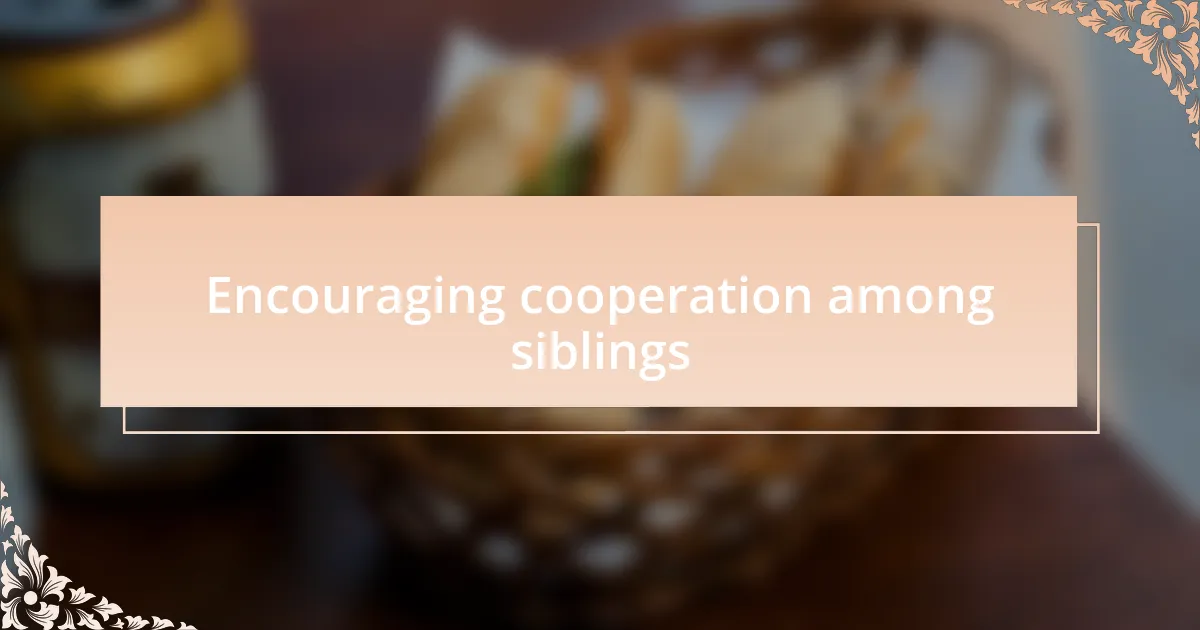
Encouraging cooperation among siblings
Encouraging cooperation among siblings can often start with simple shared goals. I once organized a neighborhood cleanup day with my siblings, turning what could have been a mundane chore into a fun event. The laughter we shared while picking up trash transformed our teamwork into a cherished memory. Have you ever noticed how a common mission can strengthen bonds in unexpected ways?
Another way to foster collaboration is through collaborative games or family challenges. I remember setting up a cooking competition between my siblings and me; instead of turning it into a contest, we decided to create a brunch feast together. By combining our culinary skills, we not only ended up with a delicious meal but also cultivated a sense of togetherness. Isn’t it amazing how a little friendly challenge can steer competition in a positive direction?
Offering rewards for teamwork can further boost cooperation. In my family, we started a “teamwork jar,” where we added a fun treat or activity for every task we completed together. This created an exciting incentive to work side by side rather than against one another. How often do we underestimate the power of collaboration and rewards in shaping siblings’ interactions? This strategy not only encouraged us to support each other but also turned shared tasks into delightful adventures.
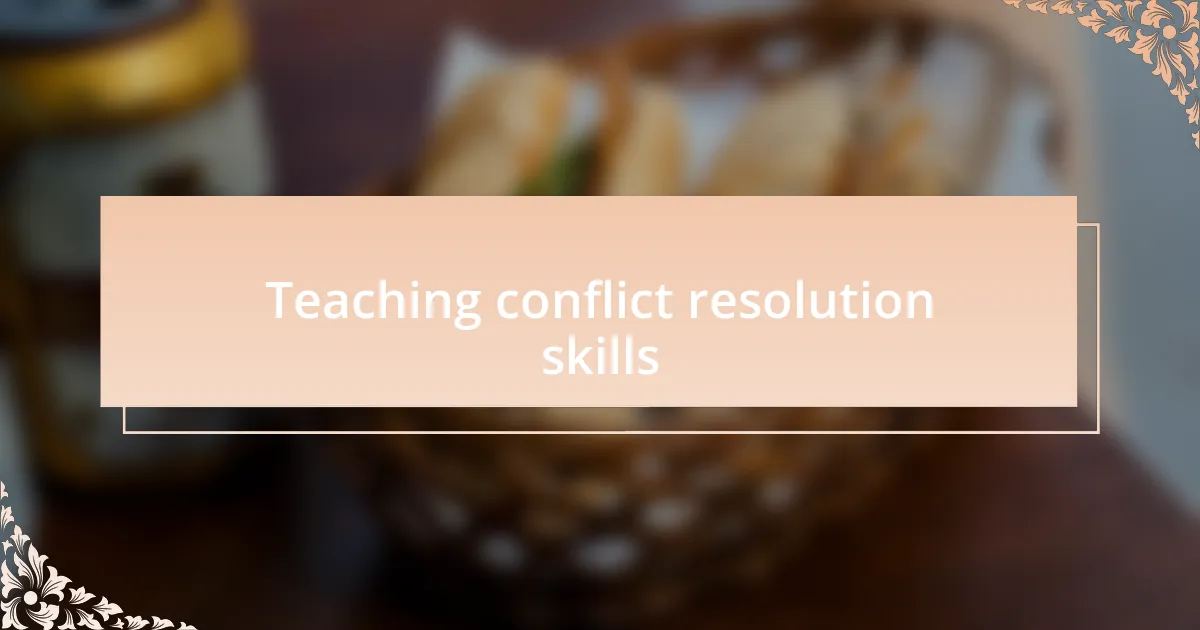
Teaching conflict resolution skills
Teaching conflict resolution skills can be a game changer in sibling dynamics. I remember a situation where my siblings and I had a fallout over a board game. Instead of letting the bitterness simmer, I stepped in and encouraged us to express our feelings about what had triggered the conflict. It was surprising to see how simply sharing what bothered us changed the conversation from blame to understanding.
Another memorable lesson came from a family trip when a disagreement over seating arrangements in the car turned into an all-out brawl. I decided to mediate by having each sibling articulate their perspective while I took notes. This helped everyone feel heard and validated their feelings. It dawned on me how empowering it is when we use open communication to defuse conflict instead of letting it escalate.
As we navigate these situations, I often highlight the importance of compromise. During one summer, my siblings and I had to decide which movie to watch. Instead of pushing our individual preferences, we brainstormed together, leading to an unexpected choice that delighted us all. It made me appreciate how conflict resolution isn’t just about solving disputes; it is about fostering mutual respect and enjoying each other’s company.
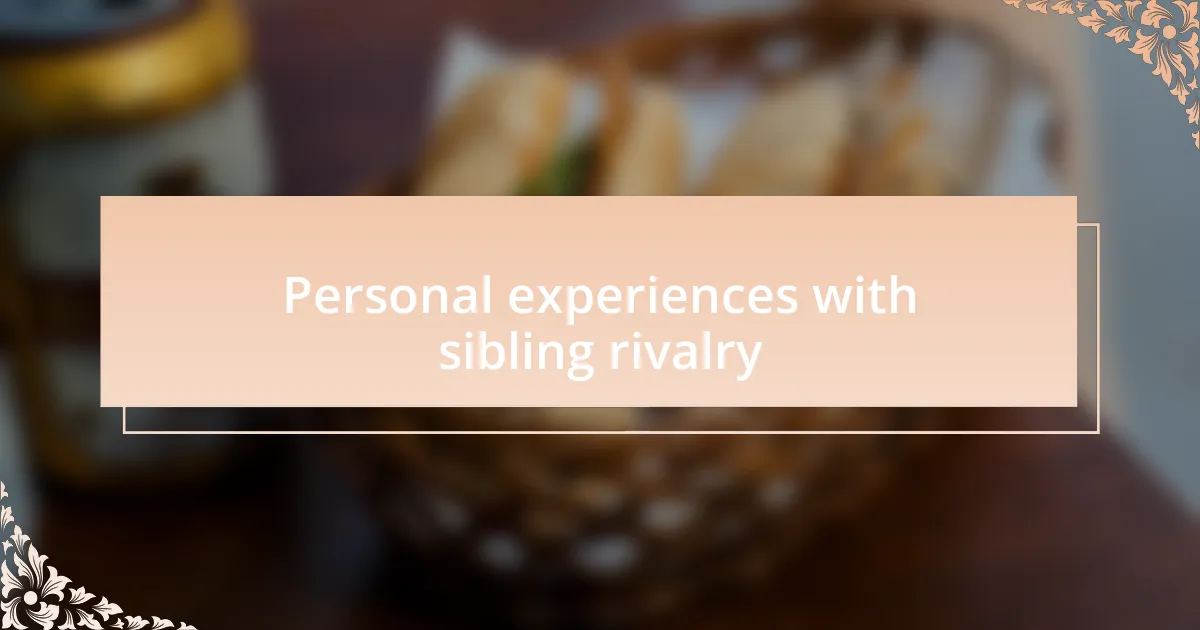
Personal experiences with sibling rivalry
Looking back, one vivid memory stands out regarding sibling rivalry. I was around ten years old when my older brother and I found ourselves in a heated argument over who got to use the latest video game console. The tension escalated quickly, and I remember feeling a mix of anger and sadness. Instead of retaliating, I took a deep breath and proposed a playful challenge: whoever won the next match gets to use the console first. It ended up being a fun way to resolve our conflict, and it reminded me that competition can sometimes foster bonding rather than division.
Another experience that shaped my perspective on sibling rivalry occurred during family dinners. Occasionally, my two younger siblings would start bickering over whose turn it was to help wash the dishes. I could feel the frustration in the air, almost tangible, as neither wanted to take responsibility. That’s when I decided to create a dishwashing schedule where everyone had a say in choosing their days. This little act not only quelled the arguments but also instilled a sense of teamwork. Isn’t it fascinating how simple solutions can transform conflicts into opportunities for cooperation?
I still chuckle when I remember a time my sister and I were arguing over the remote control during our favorite TV show. In the heat of the moment, I suggested a “remote control court.” We’d each present our case for why we should pick the next show, complete with a dramatic appeal. Not only did we laugh through the absurdity of it, but we also ended up appreciating each other’s tastes a bit more. Looking back, I realize now that turning a rivalry into a playful negotiation changed our relationship profoundly. Wouldn’t it be great if we all adopted such light-hearted approaches to resolve disagreements?